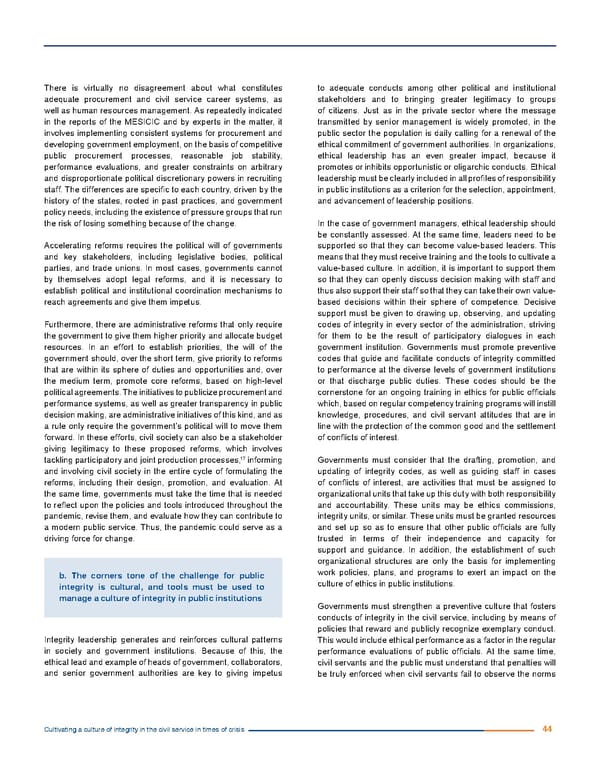There is virtually no disagreement about what constitutes to adequate conducts among other political and institutional adequate procurement and civil service career systems, as stakeholders and to bringing greater legitimacy to groups well as human resources management. As repeatedly indicated of citizens. Just as in the private sector where the message in the reports of the MESICIC and by experts in the matter, it transmitted by senior management is widely promoted, in the involves implementing consistent systems for procurement and public sector the population is daily calling for a renewal of the developing government employment, on the basis of competitive ethical commitment of government authorities. In organizations, public procurement processes, reasonable job stability, ethical leadership has an even greater impact, because it performance evaluations, and greater constraints on arbitrary promotes or inhibits opportunistic or oligarchic conducts. Ethical and disproportionate political discretionary powers in recruiting leadership must be clearly included in all profiles of responsibility staff. The differences are specific to each country, driven by the in public institutions as a criterion for the selection, appointment, history of the states, rooted in past practices, and government and advancement of leadership positions. policy needs, including the existence of pressure groups that run the risk of losing something because of the change. In the case of government managers, ethical leadership should be constantly assessed. At the same time, leaders need to be Accelerating reforms requires the political will of governments supported so that they can become value-based leaders. This and key stakeholders, including legislative bodies, political means that they must receive training and the tools to cultivate a parties, and trade unions. In most cases, governments cannot value-based culture. In addition, it is important to support them by themselves adopt legal reforms, and it is necessary to so that they can openly discuss decision making with staff and establish political and institutional coordination mechanisms to thus also support their staff so that they can take their own value- reach agreements and give them impetus. based decisions within their sphere of competence. Decisive support must be given to drawing up, observing, and updating Furthermore, there are administrative reforms that only require codes of integrity in every sector of the administration, striving the government to give them higher priority and allocate budget for them to be the result of participatory dialogues in each resources. In an effort to establish priorities, the will of the government institution. Governments must promote preventive government should, over the short term, give priority to reforms codes that guide and facilitate conducts of integrity committed that are within its sphere of duties and opportunities and, over to performance at the diverse levels of government institutions the medium term, promote core reforms, based on high-level or that discharge public duties. These codes should be the political agreements. The initiatives to publicize procurement and cornerstone for an ongoing training in ethics for public officials performance systems, as well as greater transparency in public which, based on regular competency training programs will instill decision making, are administrative initiatives of this kind, and as knowledge, procedures, and civil servant attitudes that are in a rule only require the government’s political will to move them line with the protection of the common good and the settlement forward. In these efforts, civil society can also be a stakeholder of conflicts of interest. giving legitimacy to these proposed reforms, which involves 17 tackling participatory and joint production processes, informing Governments must consider that the drafting, promotion, and and involving civil society in the entire cycle of formulating the updating of integrity codes, as well as guiding staff in cases reforms, including their design, promotion, and evaluation. At of conflicts of interest, are activities that must be assigned to the same time, governments must take the time that is needed organizational units that take up this duty with both responsibility to reflect upon the policies and tools introduced throughout the and accountability. These units may be ethics commissions, pandemic, revise them, and evaluate how they can contribute to integrity units, or similar. These units must be granted resources a modern public service. Thus, the pandemic could serve as a and set up so as to ensure that other public officials are fully driving force for change. trusted in terms of their independence and capacity for support and guidance. In addition, the establishment of such organizational structures are only the basis for implementing b. The corners tone of the challenge for public work policies, plans, and programs to exert an impact on the integrity is cultural, and tools must be used to culture of ethics in public institutions. manage a culture of integrity in public institutions Governments must strengthen a preventive culture that fosters conducts of integrity in the civil service, including by means of policies that reward and publicly recognize exemplary conduct. Integrity leadership generates and reinforces cultural patterns This would include ethical performance as a factor in the regular in society and government institutions. Because of this, the performance evaluations of public officials. At the same time, ethical lead and example of heads of government, collaborators, civil servants and the public must understand that penalties will and senior government authorities are key to giving impetus be truly enforced when civil servants fail to observe the norms Cultivating a culture of integrity in the civil service in times of crisis 44
 Cultivating a culture of integrity in the civil service in times of crisis. Page 51 Page 53
Cultivating a culture of integrity in the civil service in times of crisis. Page 51 Page 53